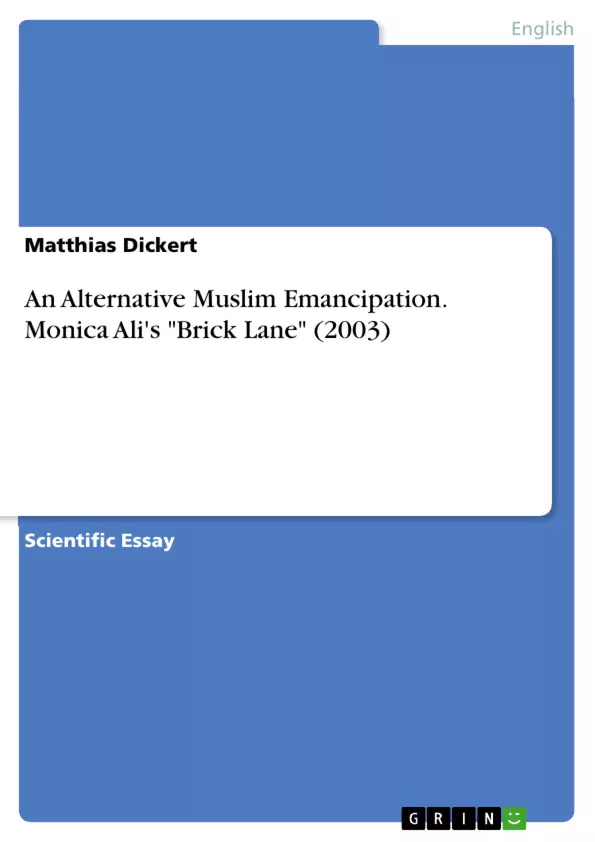Monica Ali's novel Brick Lane (2003) marked her literary breakthrough. Ali hereby followed the tradition of Salman Rushdie and Hanif Kureishi who had placed Islam back into the English speaking novel thus showing that the contemporary English novel is (still) heavily influenced by migrant writers coming from the former colonies. These writers share a double vision of England simply because they are insiders and outsiders at the same time. Their characters therefore are very convincing and they introduce Islam to the (Western) reader, a religion which for such a long time has been presented in a stereotyped and thus negative way.
Ali -like Rushdie and Kureshi - also uses London as the place of action and thus uses the literary concept of the 'postcolonial city'. Her description of the integration of a Muslim woman into British society also follows the notion of the 'condition of England novel' which confronts outer developments with human value.
Ali's main achievement, however, lies in her image of a Muslim woman who picks up the West as a chance. Ali here differs from male Muslim writers who too often confront the reader with the failure of their (male) characters.
It is exactly here where Ali's concept of a Muslim woman seems to have been a frontrunner for other Muslim writers to follow. Writers like Leila Abdoulela (Minaret 2005), Tahmima Anam (A Golden Age 2007); The Good Muslim 2011), Fadia Faquir (My Name is Salma 2007) followed Ali in their presentation oft he female thus showing a different kind of female Muslim identity.
Inhaltsverzeichnis (Table of Contents)
- PREFACE
- NAZNEEN A PERFECT IMAGE OF MODFERN MUSLIM LIFE IN ENGLAND?
- NAZNEEN A MODERN FEMINIST?
- THE PHENOMENON ON POLITICAL ISLAM IN BRICK LANE
- CONCLUSION: BRICK LANE
Zielsetzung und Themenschwerpunkte (Objectives and Key Themes)
The essay examines Monica Ali's novel "Brick Lane" (2003) and its portrayal of a Muslim woman's integration into British society. It analyzes the novel's contribution to the "condition of England novel" tradition and its exploration of themes related to Islam, feminism, and political Islam.
- The integration of a Muslim woman into British society
- The representation of a modern Muslim woman in Western literature
- The concept of the "postcolonial city" and its relevance to Muslim identity
- The portrayal of Islam and its relationship to feminism and political Islam
- The role of literature in challenging stereotypes and promoting understanding
Zusammenfassung der Kapitel (Chapter Summaries)
The preface provides an overview of the novel's critical reception, highlighting its popularity and the controversy surrounding its portrayal of Bangladeshi life in the UK. It discusses the accusation of a negative portrayal of Muslims and the novel's impact on the literary landscape.
The following chapter delves into the character of Nazneen, exploring whether she embodies a perfect image of a modern Muslim woman living in England. The analysis examines her experiences and choices within the context of her cultural and religious background.
The third chapter focuses on Nazneen's role as a modern feminist, exploring her evolving sense of agency and self-determination within the constraints of her society. This chapter examines the complexities of feminism within a Muslim context.
The chapter titled "The Phenomenon on Political Islam in Brick Lane" examines the presence of political Islam in the novel and its impact on the characters' lives. It analyzes the tensions between traditional Islamic beliefs and modern interpretations.
Schlüsselwörter (Keywords)
The essay focuses on key themes such as Muslim identity, feminism, political Islam, the "condition of England novel," the "postcolonial city," and the representation of Islam in Western literature. It examines the novel's portrayal of a Muslim woman's journey of self-discovery and its contribution to the ongoing discourse on cultural integration and religious identity.
- Quote paper
- Matthias Dickert (Author), 2015, An Alternative Muslim Emancipation. Monica Ali's "Brick Lane" (2003), Munich, GRIN Verlag, https://www.grin.com/document/286840



